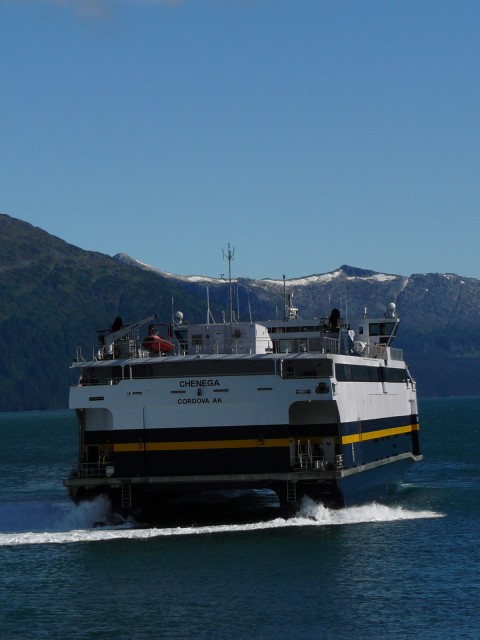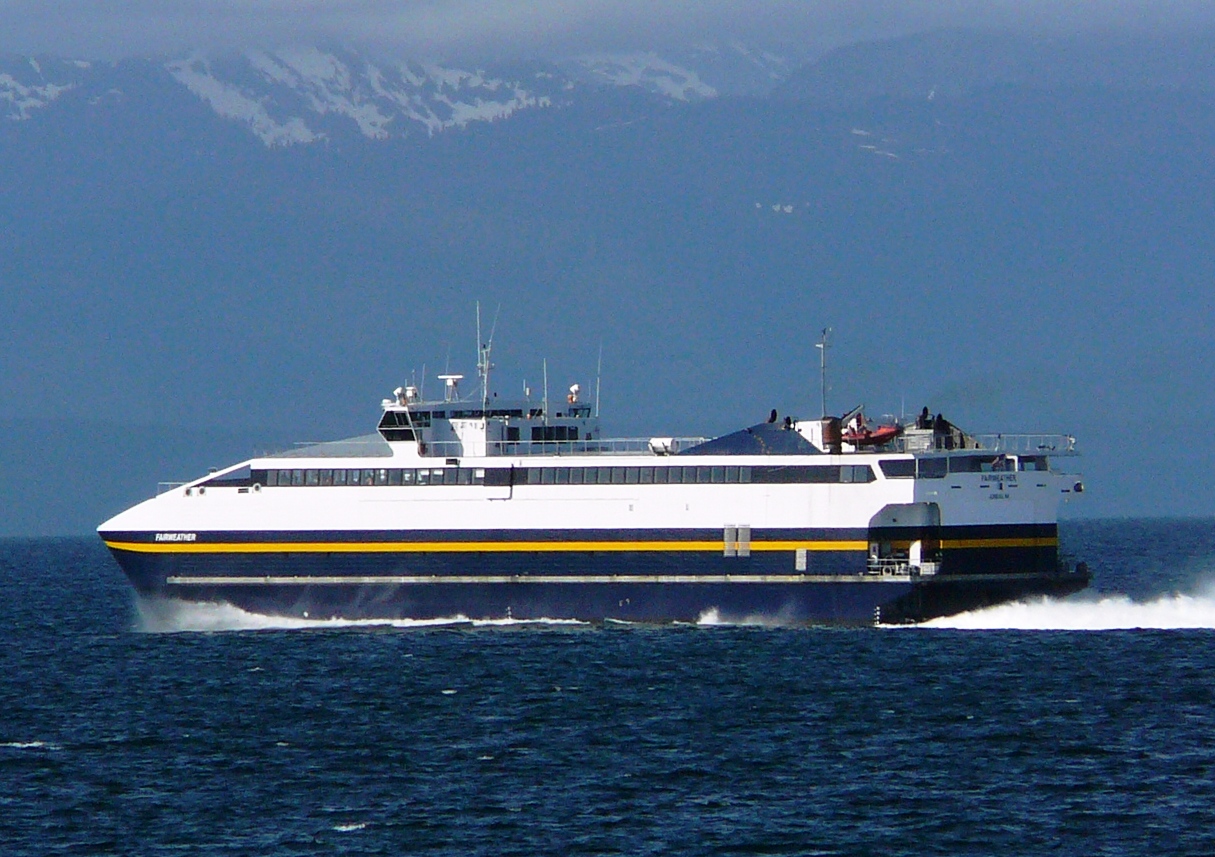
The fast ferry Chenega departs Whittier on its way to Valdez and Cordova. It and the Fairweather are out of service with no plans for their return. (File photo)
Sitkans affected by substantial ferry service cuts will voice their concerns during a rally and legislative listening session at noon Friday (10-23-15). Here are some of the impacts they expect.

Fairweather crew members and shore staff get ready to tie up the fast ferry at Sitka’s terminal. It and three other ships are slated to be out of service next year. (Ed Schoenfeld/CoastAlaska News)
A safety video plays on screens in the front longue of the fast ferry Chenega. It’s a message travelers in parts of Southeast and Prince William Sound have heard for the past 10 or so years.
But it may not play again. The Alaska Marine Highway System plans to tie up the Chenega and its sister ship the Fairweather as part of a larger budget-cutting plan.
That, and other service reductions, will leave Sitka with only two ferry sailings a week, one to the north and one to the south. The community saw between six and eight weekly sailings this past summer.
“It will harm us, just like it’s going to be harming much of the rest of Sitka,” says Don Lehmann, president of the Sitka Summer Music Festival’s Board of Directors.
He says the fast ferries, with their half-day sailings to and from Juneau, have made it easy for classical music fans to attend festival concerts.
“Among other organizations, I think that with only one north and one south ferry, our patrons will not be able to utilize the ferry system at all,” he says.
That could affect businesses providing lodging, food, fishing charters and tours to Sitka’s visitors.
One is Cinnamon Bear Bed and Breakfast, owned by Sylvia Friske.
“I’m thinking that it’s going to be a very negative impact on our business, for sure. People won’t be able to have that convenience of that short trip to Sitka,” she says.
Her business serves summer tourists and winter visitors.
“Many are very careful with their money … and if they see that it’s another flight that would be quite a bit more than the ferry, then they might decide, ‘Well, we really wanted to see Sitka, but I guess we won’t be able to’, ” Friske says.
New ferry cuts, plus the ones already in place, will affect a variety of other businesses and organizations.
Some, such as Sea Mart Quality Foods, already gave up using the ferry to bring in supplies. But individuals, such as those sailing to Sitka for medical care, will face increased difficulty.
Then, there’s school sports.
“The cuts they’ve already made have made an impact. And the fact that they’re going to make more cuts will have an even greater impact,” says Sandi Wagner, associate director of the Alaska School Activities Association.
“Getting to games is going to be almost impossible for some locations and cost is going to skyrocket. And I perceive games being cancelled and schedules having to change,” she says.
Tying up the fast ferries and two mainliners are hitting more than Sitka.
Wagner, who used to be Juneau’s activities director, says schedule cuts are making it hard for other Southeast, Kodiak and Cordova teams to travel too.
And it’s not just sports. If the past, ferry managers have scheduled sailings for 500 students traveling to Southeast’s music festival. She doesn’t expect that to happen anymore.
Of course, students, coaches and chaperones can fly. But schools are reducing or eliminating activities funding.
“It’s again going to just increase the cost to, unfortunately, the have and have-nots. The kids who can afford to fly, they’ll be going. The kids that can’t, won’t,” Wagner says.
Marine highway officials are taking comments on the proposed ferry schedule through Nov. 3.
Linda Wilson of the Sitka Economic Development Association hopes residents will make the most of the opportunity.
“I think a lot of people felt that they weren’t being heard, perhaps, and they finally stopped even making their comments. It’s time to start paying attention again and make sure their voices are heard,” Wilson says.
A statewide hearing on the schedule is planned for Nov. 4. Officials plan to finalize next summer’s ferry schedule in December.
On Friday, concerned Sitkans will meet at the Legislative Information Office, 201 Katlian Street, before the listening session, which runs noon to 2 p.m.
Soldotna State Sen. Peter Micciche, chairman of the Senate Transportation Committee, will host. State Transportation Department staff will present information and answer questions.































